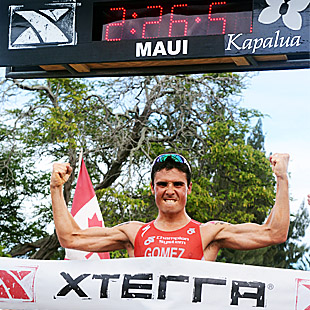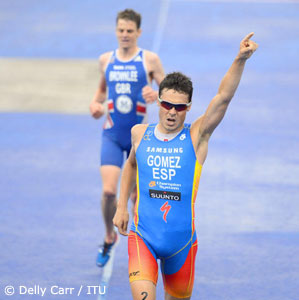A most versatile excellence
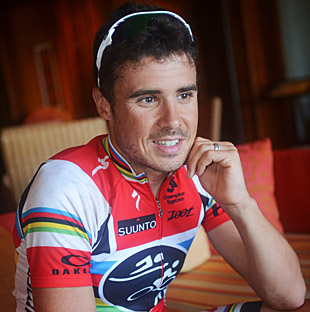
For a man who came second at the London Olympics, Javier Gomez’s record still makes a strong case for the short course triathlete of the year. At the very least, he’s shown to be one of the most versatile after prevailing in a duel with Jonathan Brownlee at the ITU Grand Final, dominating the pinnacle non-drafting showcase Hy-Vee Triathlon and its $151,500 top prize as well as taking the XTERRA World Championship on Maui in his very first shot at off road triathlon.
Gomez has won the 2008 and 2010 ITU Olympic distance World Championships, placed 2nd at the 2007, 2009 and 2012 ITU World Championships, won the 2012 ITU Grand Final and placed 2nd at the 2009 and 2010 ITU Grand Finals. He has won 12 ITU World Cups and 4 World Championship Series/Triathlon events. He placed 4th at the 2008 Olympics despite fighting an injured ankle and won silver at the 2012 Olympic triathlon in London. In addition, he won three U.S. Open Toyota Cup victories, an Under 23 World Championship, three European Championships and 5 consecutive podiums at the ITU World Championships.
With all these palmares in his CV, still the most striking impression of Gomez is not at all a bullfighter’s arrogance but rather a sense of quiet, considerate manners and an unshakeable, innate sportsmanship. However fierce his duels for big races, win or lose, Gomez never, ever pouts, whines, complains or lets his emotions override his consideration for his rivals.
Gomez showed up for this interview precisely on time in the lobby of the Ritz-Carlton at Kapalua, Maui the day before the XTERRA World Championship. While he was rousted out of bed the night before the race to evacuate his condo due to a tsunami warning, he never mentioned the incident in post race interviews.
Slowtwitch: Javier, you came off the bike at XTERRA with Conrad Stoltz. Your confidence must have been high?
Javier Gomez: I had a really good swim but I knew guys like Conrad [Stoltz] are much better than me in the technical sections. So my tactic was try to push really hard uphill because I am fit and can go hard. Then on the downhill I don’t try to go crazy fast — just recover and not crash. I was surprised they caught me so late – at Mile 14. Then Conrad came by and I tried to stay with him. Finally in the last technical section before transition, he made a little gap – maybe 20, 30 seconds. I was really tired for the run but I just started quite hard the first 2 miles. Then as I was ahead, I tried to control the gap.
ST: You have had one of the great seasons ever in the sport – silver at Olympics and in the ITU World Triathlon Series, winning the ITU Grand Final, the $151,500 Hy-Vee first place, and now winning XTERRA Worlds in your very first off road triathlon.
Javier: It was a great season. Main goal was Olympic Games – silver medal there, which was great and probably my best race ever. And I really enjoy doing different things, non-ITU things like Hy-Vee and Maui.
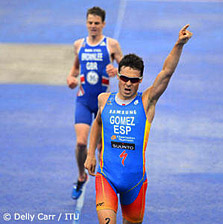
ST: This year you destroyed the old cliché is that Javier is a diesel on the run and has no sprint. Looks like you proved them wrong in Auckland.
Javier: Yeah I am surprised. But I think before that sprint I wasn’t as slow as people thought. But I am still not the fastest guy on the planet.
ST: So how have you coped to this point?
Javier: Obviously I use my strong points in my tactics. In most races, I push hard from 5k to 6k and try to make a gap.
ST: How has that worked?
Javier: If I do that and I am not able to break away, sometimes I am just dead. I cannot sprint. But training for Auckland I did some 3k races on the track where I did a sprint and I was not that slow. So I played it tactically a little different. In New Zealand, I tried to surge on the third lap [of four] and I managed to drop Sven Riederer [who finished 3rd] but not Jonathan [Brownlee], who stayed with me.
ST: What did you do different on the final lap?
Javier: The last lap, instead of trying to pass, I just stayed behind and waited a bit. The last kilometer was mostly downhill, so it didn’t make sense to try to attack there.
ST: It is easier to stay with someone on the downhill?
Javier: Especially Jonathan and his brother, who run fast downhill. So I waited. With 200 meters to go I felt quite OK, so I made my move. When we got on the blue carpet, I was running in front and I knew I had not burned all my energy. With 100 meters to go, Jonathan passed me a little bit. Then I realized I had something left and I gave it all. Other times it didn’t work. But this time – yes.
ST: On the Internet podcast, it looked like you were running a 100 meters – high knees, big strides.
Javier: When you change your speed completely, it looks like a different thing — as if all the rest of the race wouldn’t exist. In the last 200 meters as you accelerate, you change your running style as well. Obviously many times I wasn't able to do that because I would try hard the whole run and had nothing left.
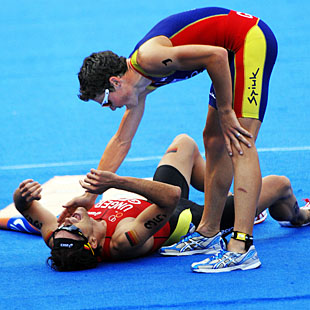
ST: Was this the scenario at ITU Worlds in Hamburg in 2007?
Javier: Yeah. That was tough because I made my move on this little hill with exactly 1k to go and I managed to get a little gap on Daniel Unger. But on the downhill he caught me again. Dan is a very good sprinter and as soon as were together, I was dead.
ST: Why did Jonathan Brownlee run out of gas in those last moments in Auckland?
Javier: Jonathan made a great effort in the swim to follow (Richard) Varga. And he was by himself with Varga for almost half of the bike — three laps at least. I guess he spent quite a lot of energy there. And from the second lap of the run the pace was quite fast.
ST: The bike itself was tough with one big hill done eight times?
Javier: Definitely one hill was very hard. It was wet as well so you don’t recover on the downhill because you have to be very careful for the corners. It was hard and lots of guys dropped off.
ST: In the future, will your rivals remember your sprint in Auckland?
Javier: I don't know how it will affect most people. But it will give me more confidence because I know I can win a sprint.
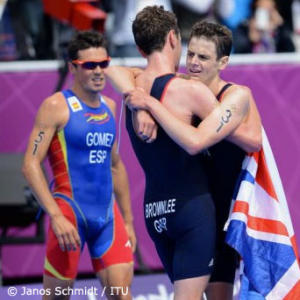
ST: How would you rate your Olympic race?
Javier: I would say it was my best race ever probably.
ST: How did the race unfold?
Javier: I was good in the swim following Varga who set a really hard pace. When we got out it was no surprise for me that there was a break of just the six of us. [Richard Varga (16:56), Javier Gomez (17:00), Alessandro Fabian (17:01), Jonathan Brownlee (17:02), Ivan Vasiliev (17:03), Alistair Brownlee (17:04)]
ST: How did the bike start?
Javier: The six of us worked together and were quite fast. Then this little group caught us. I think [Jan] Frodeno and this group that included some domestiques like Hayes pushed really hard and caught us. At that point, I worried that some riders could play some tactics which could put me in trouble. But the rest of the bike went well.
ST: When you arrived in T2 there were 12 in the front group. Was that lead worth the energy you spent to leave some very good runners far behind?
Javier: Yeah. Jonathan, Alistair and I started really fast straight out of transition. I never saw anyone else with us on the run. After the first kilometer I realized it was between the Brownlees and me.
ST: Were you aware Jonathan had to serve a penalty?
Javier: On the last lap of the bike, Laurent Vidal told me Jonathan had a penalty.
ST: What part did you think Jonathan would play at the end?
Javier: If Jonathan has something left, he had to push right away because he had to stop 15 seconds. But he didn’t push, so I thought he was at his limit and tired as well. I think Alistair started to push harder and harder and eventually Jonathan dropped back a little bit before he stopped for the penalty.
ST: When you run with Alistair, how do you measure his strength?
Javier: It is hard to know. He is a great runner and he has a very long stride. And he always looks like he is suffering a lot. His face is straining.
ST: Like Emil Zatopek, the 1952 triple gold medalist in the 5000, 10,000 and marathon? Zatopek looked like he was in the death throes and his form was very herky-jerky.
Javier: Alistair sometimes is the same. You are thinking he is dead and suddenly he changes the pace and drops you. So when he started to push harder and harder in the last 3k, I tried to stay with him but he dropped me by 20 meters on a little downhill. We kept the same gap for quite a long time. I tried surge back but I couldn’t. In the last 2k I realized I couldn’t catch him.
ST: How do you evaluate the men’s Olympic triathlon?
Javier: I think it was really complete race not only because the run was fast — we ended up running 29:07 and 29:15 — but also the bike was 44k an hour average. Plus the swim was really, really fast. The year before, the whole race took 1 hour 50 and this Olympic year it took 1 hour 46 minutes 30 seconds. It was true that it rained in 2011, so the bike was slower. But in 2012 we were still 3 and one half minutes faster.
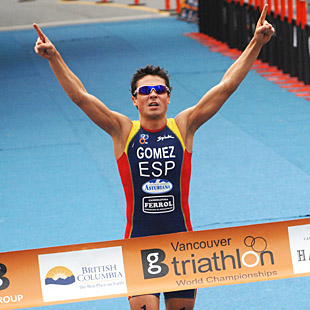
ST: Until 2009, the ITU Olympic distance world championship was decided on one day. Now the world champion is decided by the whole season. Which way is better?
Javier: The Grand Final is the most important race of the year apart from the Olympic Games. But I think the world championship now is fairer. On one hand, it is true that I beat Jonathan at the Olympic Games and I beat him at the Grand Final. But he won San Diego, Madrid and Stockholm. So I think he deserved to be the champion because he was the most consistent through the whole season.
ST: How do you feel about your year?
Javier: I am really happy the way I performed. Obviously I didn’t race as much in the World Triathlon Series because I was focused on the Olympic Games. Then after the Games I had a bad swim in Stockholm and biked with the second group. Even though I was the fastest on the run I couldn’t win the race. Then I wasn't really, really fit for Yokohama where I got 2nd place, which was still good. I trained really well for the Grand Final. It was a really tough fight with Jonathan, who is a great runner and a great athlete. But I managed to beat him in a sprint which pleased me a lot.
ST: You raced with the best in ITU since 2005. Why has triathlon experienced some quantum leaps in performance?
Javier: Triathlon is still a young sport. It is developing in all areas. Young athletes are getting better. Races are quick and there are more and more people competing at a high level.
ST: You've dueled with the best athletes for almost a decade. What do you think of this evolution in performance?
Javier: I have been racing with athletes from different generations and they were all really good. But nowadays, athletes like the Brownlees have no weak points. I remember racing Brad Kahlefeldt in 2006. We had lots of good races with each other. I knew his weak points – he was not a great swimmer. So knew I could take advantage. But athletes like the Brownlees – they are at the front in the swim, they attack on the bike and they are the best runners. So, you have to be real consistent and you have to beat them on their strongest point, the run. And that, obviously, is not easy.
ST: To put it in perspective, your 29:07 and 29:15 10k run times at London would have won the 1952 and 1968 Olympic men’s 10,000 meter run.
Javier: Yeah it’s crazy. I don’t think we would run much faster without the bike. Just 10 years ago we probably would have won the Olympic triathlon running one and a half minutes slower. Maybe in 10 or 20 years the guys will be running 27:30 or something.
ST: Does that make triathletes of today better than the first generation?
Javier: You have to try to be the best of your generation. You cannot compare us with Mark Allen and those guys. They were the best of their era and were absolutely amazing athletes. The Brownlees are probably the best of this era. But we cannot compare ourselves with the ones in the future. Everything changes. Everything develops.
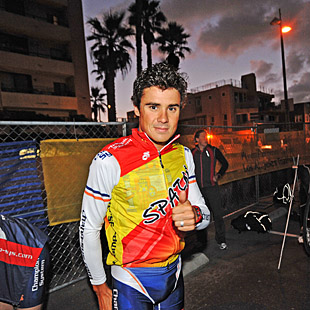
ST: What is your perspective about drugs in cycling? Now the champions of the last 20-25 years, those riders and those exploits, are being erased from the sport’s history.
Javier: It is really sad what is happening in that sport. They were really great athletes and I am pretty sure that Lance was the best athlete of that era.
ST: Do you agree with the punishment?
Javier: I am happy that if you cheat you are caught. But why only Lance Armstrong? It was the whole system in cycling. Back then everyone was doing pretty much the same. So if they want to clean it, there are still a lot of people – directors, doctors, trainers – who are still in the game. You have to really clean out all that. Not just take away one athlete’s 7 Tour de France titles.
ST: Can you actually race the Tour de France without doping? Is cycling 100 percent clean now?
Javier: I am not sure if it is clean or not. But in my opinion it is much cleaner than years before.
I am pretty sure you can race Tour de France without doping, but maybe not as fast.
Everything about the bikes and training methods has advanced, but the guys are riding slower than before. So that makes you think. But it is not that you can’t race the Tour de France. These guys are professionals. These guys train a lot and are ready for that. When everyone is doping, everyone goes faster, recovers better and goes harder uphill. But I think when everyone is clean the race will be even better because you will see guys having a tough time.
ST: Do you think triathlon is relatively free of doping now?
Javier: We have lots of controls and now we have the athletes’ biological passports. We also have to be located every day of the year for testing. They know where I am the whole time, which is good. I am completely sure you can be world champion without doping. Because I did it myself [twice]. I also think the men I compete with are clean, too. I have no evidence that any triathletes are doing drugs and I do not have suspicion. If you think they are on drugs you can get crazy. Yes you hear stories from this one or the other. But it is just rumors and I don’t think about them.
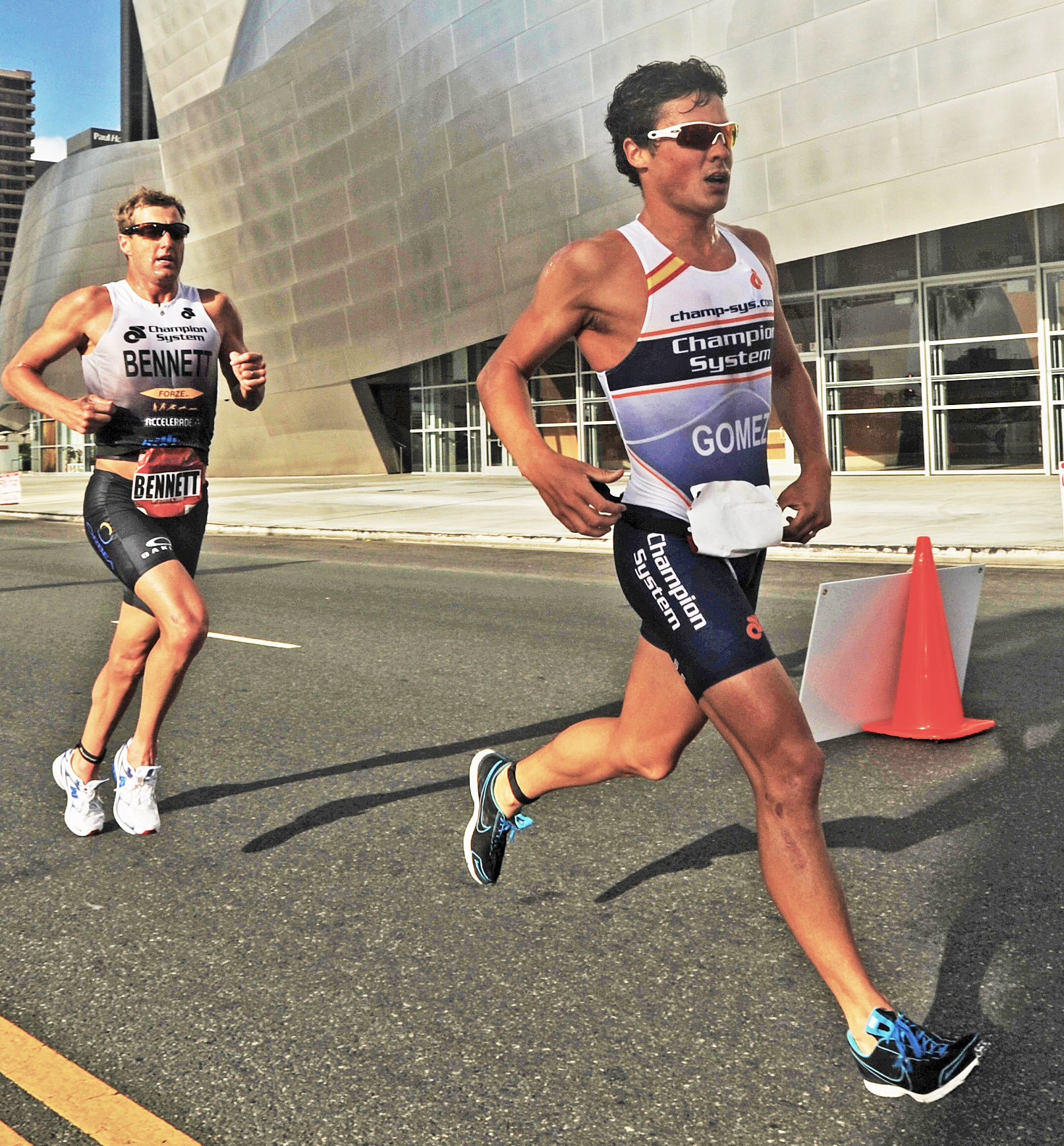
ST: What was the best duel you ever had?
Javier: The 2009 ITU Grand Final in Australia was one of the great ones. The bike was really slow, just a big pack ands nothing happened. But on the run we started sprinting and we never stopped. LAUGHS I tried to break away many times and Alistair beat me in the end.
ST: It came down to the last 200 yards.
Javier: Yeah. I was trying to change the pace the whole time and I couldn’t drop him. At the end, he beat me. Also that year the European Championships was good too. It was a very hard race in hot conditions. There was a hill on the run and I managed to break away there and beat Alistair.
ST: Where do you stand in popularity among Spanish sportsmen?
Javier: In Spain it is difficult to be on the same level as the soccer players and some idols like the tennis player Rafael Nadal or Fernando Alonso, the Formula One driver. But triathlon is getting more popular, especially after Olympic Games. That was an event everybody saw, not only the people who follow the sport. Now people stop me when I am walking down the street or ask me for a picture — which is nice – nothing crazy. I would not like to live life like a soccer player because things could get pretty complicated.
ST: How are your sponsorships going?
Javier: Specialized is a good one because the contracts and the bikes are great. But especially for the support we get before and after the race. Here we finish our training and we drop the bikes with the Specialized support and they clean it and prepare it for the next day. Specialized also provides physios. All that support is important. Also I have been with Oakley for many years and they have been very supportive. Champion Systems nutrition – gives me the same positive support.
ST: Do you have national sponsors?
Javier: It is funny. I do not have a Spanish national sponsor. I have received some help from Spanish institutions and I get some help from the regional government. But no Spanish companies are supporting me at all. All my sponsors are international, which I am happy with. But it is a shame. It would be nice to get support from your country.
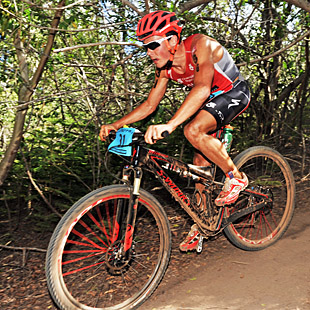
ST: What will be your focus through 2016?
Javier: After the Olympics, I took some time to decide what I want to do for the next 4 years. Right now, my motivation is Rio. I think I can be competitive there. I only want to go if I can be competitive and fight for a medal. I've been an Olympian already. I don’t need to go again just to go to the Olympic Games.
ST: After Rio, will you try something different?
Javier: Probably yes. I think it would be fun to race Kona and it would be a new challenge. I am not sure if I would go well or not. But why not try it? That’s why I am racing XTERRA now.
ST: If your desire is to beat the Brownlees, what can you do?
Javier: We had to run under 29:10 to win the Olympics. But we will need to improve. At Rio I am pretty sure you will have to run 28:45 — depending on conditions of course. I am pretty sure it’s going to be a hot race and it’s going to be slower but the effort will be something in the range of 28:45. So for that I will obviously keep on training hard on the run and probably train less on the swim.
ST: People are racing at the top level much later. Craig Alexander and Macca at 39. Greg Bennett won Hy-Vee in 2011 at 39 and was 3rd again this year at 40. This year at Hy-Vee Hunter Kemper was 2nd and Bevan Docherty was 4th, both at age 36.
Javier: These guys show you can have a long career. They are still really great athletes at almost 40. I think it is about taking care of yourself and getting a good rest between seasons. And you have to be lucky or smart enough not to get injured.
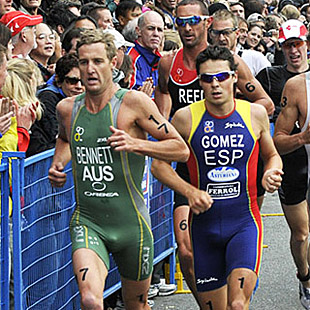
ST: Are you tempted by the Ironman?
Javier: Yes. As I said, I like to try different things. That is why I did some non drafting races like Des Moines and I came to XTERRA. Next year I hope to do some 70.3 races.
ST: You are ready?
Javier: I don't think you need to change your training much for 70.3. For Ironman, yes. You need to train differently. And fueling and refueling during the race is very important.
ST: You made a strong statement after you were pounded on the swim by Harry Wiltshire at the European Championships and he was banned 6 months. Can you forgive?
Javier: Of course I forgive him. It was tough at the moment. Not only because of the situation, which was pretty frustrating. It was really crazy. I race for a long time and it never happens. Sometimes you have a fight in the water. But not something like that. And yeah it was European Championship in my home town with 50,000 people out there watching the race. Because of that, I felt very bad I wasn't able to perform.
ST: If you ever to run into him somewhere – let’s say he came up and said he was sorry – would you talk to him?
Javier: I would not refuse to talk to him. If he wants to talk about that, I don’t have any problem. We are persons, we are humans, we can talk. That is fine. To be honest I don’t think much about it.
ST: Of all the people you competed against, who do you respect the most?
Javier: When I started, Simon Whitfield was a hero. When he won Sydney I was a junior and I saw he is an amazing athlete, really talented. It wasn't just that he won. But not being a good swimmer, I admired how he managed to get close enough to contend on the bike and win on the run. That was pretty amazing. And he always gives me good races and good respect. I really appreciate that. I also have a good relationship with Greg Bennett. I had a chance to train with him in Australia for a few years and he was very generous. We talked about a lot of things in triathlon and training that are good to know. He is has been in the sport a long time and is always improving. I have to say I learned a lot training with him.


